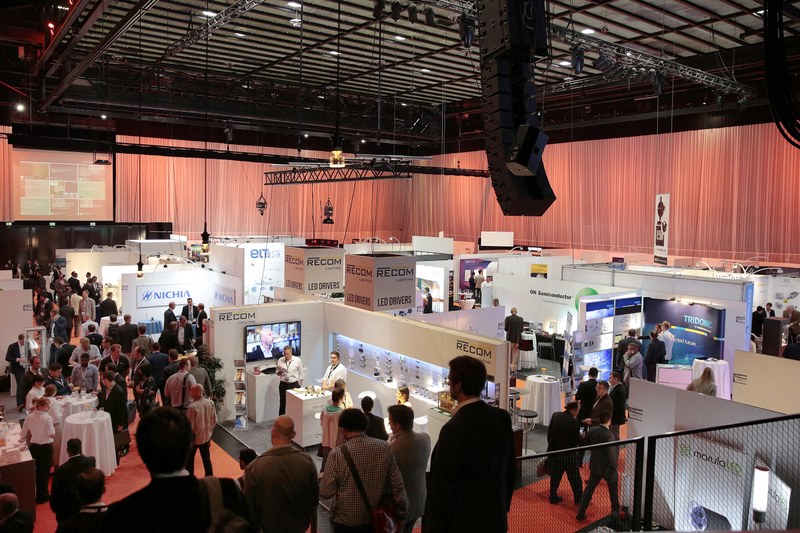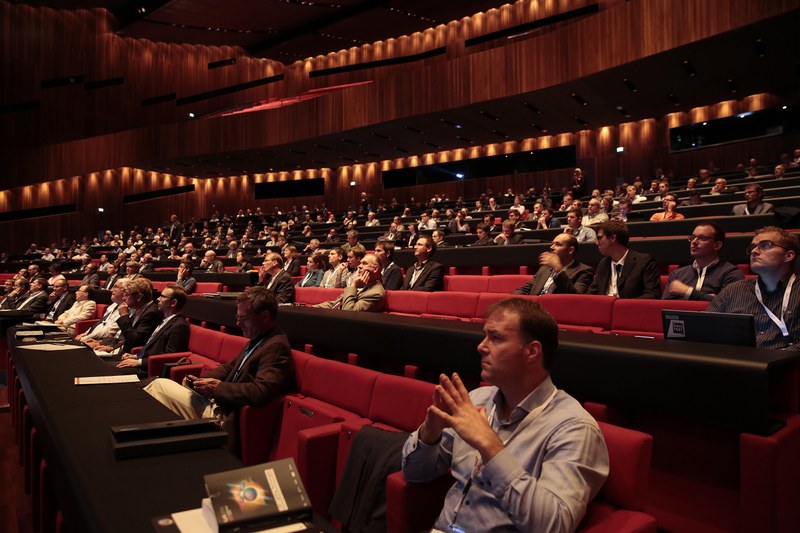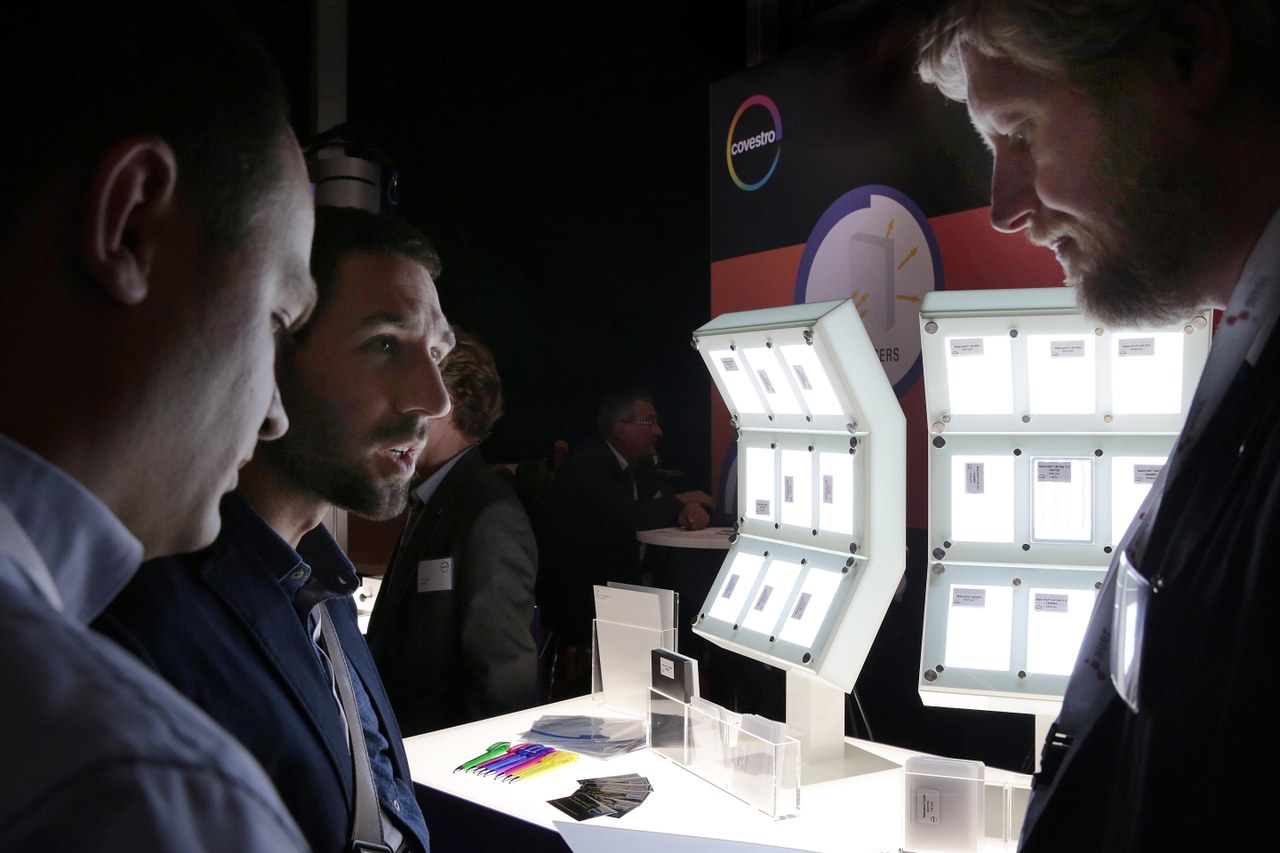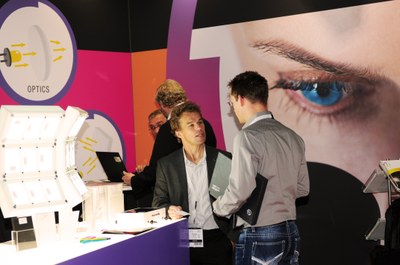LpS 2015 Post Show Report: Trends, Technologies and Solutions
Since the biggest cutting edge developments in LED technology have already taken place, one would think that a technology-focused event would be obsolete. However, that is not the case! The LED professional Symposium +Expo (LpS 2015) showed that developments in the lighting industry aren’t slowing down. New user requirements demand a shift from a component-based view to a system perspective. At sixty lectures and seven workshops, international experts presented their findings and analyzed future trends and technologies. A total of about 1,400 attendees from all over the world came to the event, which took place from September 22nd to 24th in Bregenz, Austria.
Facts, Numbers and Feedback
The LED professional Symposium +Expo (LpS), known as a point of reference for technical lighting professionals dealing with LED and OLED lighting components, modules and systems, took place for the 5th time this year. Over 100 exhibitors showed their latest developments in the growing exhibition. Seven of the world’s biggest LED manufacturers, namely Nichia, Cree, Everlight, Lumileds, Osram, Samsung and Seoul Semiconductor chose the LpS 2015 to showcase their products and services. No other event in the world can boast having these seven giants together at an exhibition!
 Exhibition
Exhibition
With 1,400 attendees from 48 different countries, the LpS 2015 shows a 25% growth rate compared to last year. Over 30% of the visitors were engineers, followed by 22% sales and businesspersons. 18% were from the corporate level (CEO, CTO, etc.) and an additional 7% of the visitors were planners, designers and architects. 3 % were people from the fields of education and journalism. Pars Mukish from Yole Développement, a speaker and attendee, noted, “The LpS is getting bigger and bigger. What is important to say is that there are more and more Asian and American companies. The event is getting much more international, which is important for personal networking.”
Participants described the event as being unique and especially stressed the quality and technical focus of the symposium and exhibition. Almost 90% of the attendees rated the event as “excellent” or “very good”. “I went to seven different presentations. Each of them was outstanding quality with very good speakers who knew their topic. The topics were detailed enough and gave me very good insights,” said Mr. Stoppelaar, Secretary General, at LightingEurope.
Trends and Technologies
With the shift from a component to a system approach in mind, the keynotes gave a great overview of the connection between design and technologies in order to analyze trends for future lighting systems – the focus of the LpS 2015.

Rogier van der Heide, Chief Design & Marketing Officer at the Zumtobel Group, talked about the different opportunities of LED lighting. He went on to explain about the connections between marketers, engineers and designers. The marketers create a proposition, and technology is what makes it all possible. However, to connect with the end users, design is the key as it connects people at an emotional level. He sees design as the key to turn a company into a “powerhouse of innovations”. He explained that there is a transformation of the lighting industry taking place, from hardware to software and controls. This means that the designer profession is changing. In the past they designed the shape of the luminaires but today they have to pay much more attention to software, content and orchestrating the entire system to make it something meaningful for the user in different application areas. This means that new skills are required and data modeling, algorithm design, voice scripting, and gesture design need to become common design practices.
The second keynote speaker, Prof. Zary Segall from the Royal Institute of Technology (KTH) in Stockholm, took the audience into the world of intelligent lighting and introduced them to a topic that hardly anyone had heard of before: Semantic Lighting. Throughout his inspiring talk he shared his visions and connected them with the existing possibilities of digital lighting. Smart digital lighting in combination with artificial intelligence can assist people in daily life. Light can, for example, assist a person who is preparing tea. It will tell them when it is brewed according to the user-defined temperature. Prof. Segall is convinced that “Smart Lighting is all about you and your user experience, and Semantic Light user experience means that the physical and digital space is one, and light is the ‘glue’.”
 Audience at the Opening
Audience at the Opening
In the third keynote, Mr. Jy Bhardwaj, Senior Vice President R&D at Lumileds, analyzed trends and challenges for system integration. In his opinion, adding value must be the main goal of using technology and therefore technology needs to be optimized in this direction. He sees a transition of the business over time in on the three different levels of socket replacement, form factor innovation and connectivity and infrastructure integration of LEDs. While the second phase has just begun, the third very visionary phase is the most exciting and challenging. In his mind reliability and also simplicity in applications are important. He mentioned that user confidence needs to be built up at the current stage.
Over the three event days 60 lectures and 7 workshops were given by lighting experts. They analyzed and defined building blocks for future LED lighting designs, addressing light sources, smart controls and drivers, optics, light quality, light mixing, connectivity, security, reliability and lifetime, standardization, light measurement, production and lighting systems.
 Workshop
Workshop
A great overview of the outcomes of the lectures and workshops was given at the final tech panel on the last event day, where attendees, speakers and chairpersons were invited to summarize the impressions and main take-aways from the past three days. The high number of comments about the lecture and exhibition highlights showed how important the application view has become during the last few years. In addition, some technologies that had not been on the radar of many companies were identified and will probably be implemented in future products. One of these technologies was Monocrystalline Phosphors. Heinz Seyringer from the Zumtobel Group chaired two “Light Sources” sessions and sees a big potential in this technology being implemented. Furthermore, he pointed out the usefulness of the rock-solid comparison between OLEDs and LEDs used in different application areas given by Pars Mukish.
A further aspect that was discussed at the tech panel was the light quality, which has become a focal point of interest and supports the opinion expressed in all three keynote speeches, namely, that user experience is the most important issue. This also supports the trend of Human Centric Lighting. Questions like, “What does the user feel using the product?” and “How is the user’s life influenced?” come up. Technology has to support a positive answer. Furthermore they went on discussing the color-rendering index as an important factor for color quality. Dr. Nisa Khan, chair of a “Light Source” track, as well as a “Measurement and Production” session, highlighted the challenges of the CRI definition. In the US the Illuminating Engineering Society (IES) came up with TM-30-15 to measure and quantify some aspects of the color rendition and to show the different improvement specifications with the CRI definition. She hopes that CIE will have a closer look into it and decide if it is necessary to find a new definition and measurement technique for CRI. Another topic discussed was the Internet of Things. The lighting industry is influenced by different domains while the computer community, e.g. Google. Information Technology and algorithms become more and more relevant.
 Product Showcase at the Exhibition
Product Showcase at the Exhibition
Over 20 Product Launches
In addition to the lectures and workshops, participants could visit the exhibition and see the latest technologies. Over 20 products were introduced to the market for the very first time. One of the highlights was the new color portfolio, Luxeon C from Lumileds. It is designed with a single focal length, which means that all of the colors have the same focal point. The outcome is that the LEDs provide the same crisp image for every single color while using a lens. Furthermore, the LED dome is engineered so that the light does not mix with the adjacent LED. Thereby it prevents crosstalk and makes it easier to design and maintain color control. LG Chem launched the world’s largest, flexible OLED panel. It was very recently developed and shipped to Bregenz directly from Korea, just in time for the event. A detailed summary of all product launches will be published in the Nov./Dec. issue of the LED professional Review.
Outlook: LpS 2016
The LpS 2016 will take place from September 20th to 22nd in Bregenz, Austria. The main focus will be on Smart Technologies for Lighting Innovations and novel price winner Prof. Shuji Nakamura will be one of the keynote speakers. The Call for Papers for the LpS 2016 will open at the end of October, 2015. More information at www.LpS2016.com/CfP.







